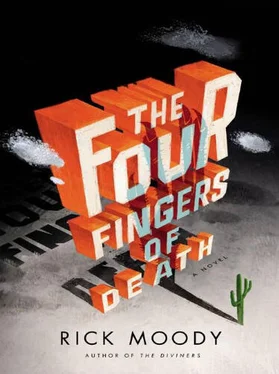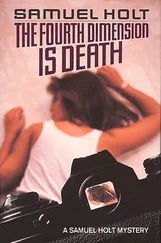A couple of nights passed in this fashion, and Debbie got more and more mute, and preparations that she was supposed to be making for desalinization of the planet’s surface, and tests for the various kinds of bacteria we were hoping we might find, and meteorological studies of the dust storms, none of her work was getting done. Debbie had a hunted look, one of the classic features of Planetary Exile Syndrome, and she stared out at the nebulae, sure, through the telescope, and she stared out in the direction of that supposed black hole, the nearby one they were predicting. She did some crossword puzzles. Steve, or so he told me, was thinking, okay, is this sustainable? Is this how it’s going to go for months? She’s going to be worthless for the rest of the trip?
Listen, I know that I am putting words in Steve’s mouth here, but let’s say he thought something like this, the third night when Abu was asleep down in the cargo hold, and Steve and Debbie were meant to be on the same shift. Despite direct orders from management back on Earth, Debbie didn’t take her powerful antipsychotic sleep medication. Couldn’t the guys in Houston have monitored her with some of the life-support diagnostic tools they had going? Didn’t they know when her pulse was depressed, when her breathing was shallow? You’d think they could monitor this, and you’d be right. Except that they didn’t. Except that Debbie hadn’t taken her medication and wasn’t asleep. She was waiting. And then Steve, believing that she was going to be damn near catatonic for hours, kind of went off shift a little earlier than scheduled. It wasn’t infrequent, see, that the mindless repetition, in a tiny enclosed space, made us careless.
Debbie unstrapped herself from that standing position that was really a stretched-out sleeping position, and in total silence she drifted across the capsule, and then she rappelled down the ladder into the cargo hold, and, because there just really weren’t many sharp objects in the capsule that she could use if she were going to try to puncture-wound Abu Jmil, she settled on a weapon that would have required a fair amount of preparation, preparation we had all done in training, and the weapon was the soldering gun that Abu was using for his not-entirely-necessary reengineering in the cargo hold. While he slept, she got this soldering gun right up next to his face, and need I remind you that he was strapped down, and she could easily just have soldered him to death right there. But she elected to say something first, kids, which was “You think I don’t know what you’re trying to do? You’re waiting until we get to the planet, and then you’re going to use me as some kind of lab rat for whatever we find down there. In that canyon. You know the air pressure is a lot more conducive to water down there, and there’s water that won’t evaporate, right? It’s swimming with microorganisms, I know, and you want me to serve as the guinea pig for the microorganisms. Well, you can forget about it .” There was some more stuff about this, more bacteria and single-celled organisms, internecine plots of various kinds. There was enough paranoid verbiage that Abu awoke.
Let me describe him for you. Abu was a kindly and burly Asian American kid from Kansas City whose parents were both astrophysicists. He was the youngest guy on the mission, and yet he wouldn’t squash a mosquito if it were sitting on his nose. He was olive skinned and rather aquiline. He had a close-cropped beard and black hair that was kind of curly. At this moment I’m describing, reconstructing it from what I was told, he had a soldering gun about an inch from his eye, and he’d just been accused of plotting to leave Debbie Quartz on the surface of Mars. And he was strapped down so he wouldn’t float around in his sleep, and the only way for him to save himself was to persuade her that her entire imaginary conspiracy was erroneous, hysterical, and part of a bad, bad case of Planetary Exile Syndrome. (Though as with so many other biochemical mental illnesses, it just didn’t do to tell someone with Planetary Exile Syndrome that it was all in her head.)
Abu, recognizing the necessary diplomacy, became as gentle and unassuming as a guy can get: “Debbie, talk to me. Tell me what’s going on. Tell me what you think is happening. Debbie, think about it. Think about those years of training together. Let’s talk about you and me, and our time of training. Remember when I wasn’t sure about the underwater stuff? I had that phobia about sharks? The atoll wasn’t really shark infested; that’s what you said. That NASA wasn’t going to make us train in a spot that was shark infested, because it was highly unlikely that Mars was going to have sharks on it. And they didn’t want to lose one of us to a shark after all the expense they had gone to, to train us. Do you remember how I wept when you told me that I wasn’t the only one who’d thought about giving up? You said that I wasn’t any less important to the mission because Denny had to give up when his son was diagnosed with whatever that was. Non-Hodgkin’s lymphoma, right? Do you think that I would jeopardize a friendship that had all of those good memories as part of it? Those heartfelt exchanges? Think about it, Debbie, before you put my eye out with that thing.”
This was the kind of stuff Abu said. And he said something about how he was the one who suggested that we use Debbie, because of how plucky she was, as our mission mascot on the night of the big dinner when the personnel had been announced for the various rockets. We went to that Italian joint by the water. We hoisted Debbie Quartz up above our heads, Abu reminded her, and we passed her around like she was a medicine ball, and we all chanted “Olympus Mons, Olympus Mons!” And we told her it wasn’t because she was just lighter than anyone else, it was because she was sweeter than anyone else, and this was why we loved her, because she was sweet, and she was incredibly competent, and for this reason, we did not throw her into the alligator-infested canal after dinner. We honored her request, or this is how I remember it anyhow, and instead I, Colonel Jed Richards, got thrown in, and I think this is because there were people who would have been happy enough if I had been attacked by Floridian wildlife. We knew that throwing Debbie Quartz into the canal was conduct unbecoming, and so I offered myself up, because I know I am an interpersonal challenge, and said that I would be much more a regulation example of horseplay, and sure enough Lepper, that lunkhead, grabbed one of my arms, and before I even got to strip down to my skivvies, I found myself looking up at the lights of the dock from down in the murky depths.
Abu recounted these and other stories to Debbie, while Steve slept. The cough button was depressed. No one in all the infinite expanse of space knew what was happening down in the cargo hold, how two good and reliable officers of the National Aeronautics and Space Administration were poised to wreak bloody havoc on each other. No one knew how long this scene played out. Debbie breaking into angry and convulsive sobs, saying, “How can I trust you? How can I trust anyone?” Still, Abu didn’t panic, keeping one eye, wherever possible, on the intercom button that was on the side of the bed. Awaiting the moment when he might free up an arm enough to get at it.
“Debbie,” Abu pleaded, “I don’t have any idea about how the mission got moved to the canyon. I just don’t have any idea about it. I’m as confused by it as you are.”
“Don’t you know what they’re looking for?” Her hands were shaking, holding the soldering gun. “Because I do, and I think you do.”
“I don’t know, Debbie. I don’t know what you’re talking about. I’m here because Denny dropped out. I’m the resupply shift; I’m the extra man. Maybe I pilot one of the ultralights. The guys in the Excelsior and the Pequod have the manpower they need. We’re the third of three vessels, and I’m the third astronaut on the third ship, and all I do is drive people around. I don’t have any idea why we’re going to the canyon. I just do what I’m told. On a need-to-know basis.”
Читать дальше












